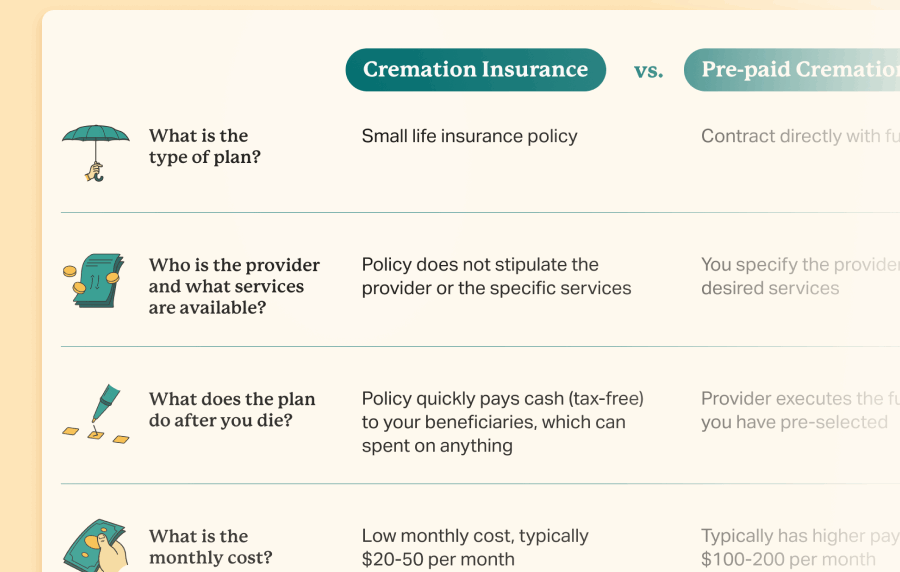1) Use Life Insurance Policy Locator Services
Several online tools enable you to search for a life insurance policy using a Social Security number or other personal details. The National Association of Insurance Commissioners (NAIC) free Life Policy Locator should be your first stop.
The process is simple. First, enter your personal contact information. Then you’ll share the deceased’s death certificate information, including their:
- Social Security Number.
- Date of birth.
- Date of death.
- Legal name.
- Veteran status.
- Relationship to yourself.
The company will only contact you if it discovers a match.
Estate executors or the closest living relative can also use the MIB Policy Locator Service to search for life insurance policies. This service searches life insurance applications, but can’t confirm whether a policy was issued or is currently active.
The MIB search requires you to mail:
- A notarized and complete application.
- An original death certificate.
- A $75 payment via money order or certified check.
If you know which companies they applied with (assuming there are some), you could then contact each of those insurers to verify if they had a policy.
Finally, you can search for unclaimed property, including a life insurance policy, through the National Association of Unclaimed Property Administrators website and Missing Money.
2) Search State Registries
Unclaimed benefits are eventually transferred to the policyholder’s state of residence. Find your state registry at unclaimed.org, then submit the deceased’s personal information to find unclaimed property.
3) Check Bank Statements
The overwhelming majority of people who have life insurance are paying for it via an automatic deduction from their bank account. Therefore, check your loved one’s bank statements to see if any insurance companies have been deducting payments from their account. If so, contact them to determine if a life insurance policy was in place.
4) Look Through All Personal Documents
People commonly store paper files in desks, file cabinets, financial binders, or safes. You may perhaps stumble upon a policy or other document that identifies which insurance company the insured was with (if any).
Don’t forget to check digital files as well. If you can access the deceased’s personal computer, you can search the computer for phrases like “life insurance company” or “certificate of insurance” to find saved files. You can also search their emails, provided you have access.
5) Contact Professional Advisors
Knowing the deceased’s insurance agent is the easiest way to find policy details, and they’ll help you file a claim once you confirm your identity. If they had a financial advisor who managed their investment portfolio, they would likely be familiar with any life insurance that existed.
The deceased’s lawyer(s), financial professionals like accountants or tax advisors, or former employers may also have documentation of existing insurance policies.
6) Talk To Friends And Family
The deceased’s loved ones may know about existing life insurance policies. If they know where the deceased stored personal documents, which insurance companies they worked with, or likely beneficiaries, you can use these specifics to track the policy details.
7) Check Employer For Group Life Insurance Benefits
If your loved one was working or retired, they may have had a group life insurance benefit provided to them. Contact the employer to determine if they offered a group life insurance benefit and, if so, to obtain the name of the insurer to contact for filing a claim.
Who Can Access Existing Life Insurance Policies?
Just because you discovered an existing policy doesn’t mean you can access the policy details or file a claim. Only the following relationships may have access to the deceased’s policy:
- Next of kin (E.g., spouse, child).
- Named beneficiaries.
- Executors and trustees.
Life insurance policies usually name specific beneficiaries to receive the death benefit. Beneficiaries are entitled to spend the money as they so desire.
If there is no living primary or contingent (backup) beneficiary, then the money is paid to the insured’s estate. In that case, the proceeds would be subject to the probate process and then distributed according to the policyholder’s wishes outlined in a will or estate planning document.
How To Find Out If You’re A Policy Beneficiary
If you know the name of the insurance company with which they had a policy, you can contact them to confirm if you’re a designated beneficiary. If so, the insurance company will assist you in filing a claim.
If you’re not a designated beneficiary, you won’t receive any additional information from the insurance company. However, the insurance company can attempt to contact the policyholder’s beneficiaries now that they’re aware of the death.
How To Claim Life Insurance Death Benefits
To file a death claim, life insurance companies will require either an original death certificate or a copy. That confirms the policyholder’s death, allowing the company to pay out the death benefit.
You’ll submit the death certificate and the required paperwork provided by the life insurance company. Then the beneficiaries will clarify how they want to be paid and provide all necessary personal details to the insurance company.
What Happens To Unclaimed Benefits?
Life insurance companies don’t automatically receive death records, so benefits may go unclaimed if they are notified of someone’s passing. However, life insurance companies are often required by state law to regularly review the Social Security Administration’s Death Master File to identify clients who have passed and make a good-faith effort to contact their beneficiaries.
Unclaimed benefits remaining after the company completes these steps are forfeited to the state — often after several years. These benefits are then listed on the state’s unclaimed property registry for loved ones to search and submit a claim.
Frequently Asked Questions
If you’re searching for an insurance policy a loved one bought long ago, the insurance company may have been acquired, changed its name, or even closed its doors since then. A quick Google search might do the trick to figure out the situation, but if you’re still in the dark, reach out to your state’s insurance department for more details.
Yes, it’s possible, and in such cases, you’ll have to reach out to the insurance provider to claim the benefits upon the insured individual’s death. If you suspect you might be the designated beneficiary of a life insurance policy, you can use life insurance policy locators to try to confirm the information.
Life insurance companies typically won’t automatically reach out to inform you that you’re a beneficiary after someone passes away. In fact, they often don’t have the contact information (phone number, email, or address) of the beneficiaries. It’s a good idea to be proactive and contact the insurer yourself.
- Nationally licensed life insurance agent with over 16 years of experience
- Personal annual production that puts him in the top .001% out of all life insurance agents in the nation.
Anthony Martin is a nationally licensed insurance expert with over 16 years of experience and has personally served over 10,000 clients with their life insurance needs. He frequently authors entrepreneurial and life insurance content for Forbes, Inc.com, Newsweek, Kiplinger, and Entreprenuer.com. Anthony has been consulted as an expert life insurance source for dozens of high-profile websites such as Forbes, Bankrate, Reuters, Fox Business, CNBC, Investopedia, Insurance.com, Yahoo Finance, and many more.
- Nationally licensed life insurance agent with over 20 years of experience
- Best selling Amazon author.
Jeff Root is a nationally licensed life insurance expert with over 20 years of experience. He has personally helped over 3000 clients with their life insurance needs. Jeff is a best-selling Amazon author and the managing partner of a highly successful insurance brokerage that manages over 2,500 licensed insurance agents across the USA. He has been a featured life insurance source for prestigious websites such as Forbes, Bloomberg, MarketWatch, Nerdwallet, and many more.
- Nationally licensed life insurance agent with over 15 years of experience
- Best selling Amazon author of five insurance sales books.
David Duford is a nationally licensed insurance expert with over 15 years of experience. He has personally helped more than 15,000 clients buy life insurance. David has been featured as an expert source for highly authoritative publications such as A.M. Best and Insurancenewsnet. He also runs one of the largest Youtube channels to help aspiring insurance agents serve their clients better.
- Nationally licensed life insurance agent with over 20 years of experience
- Best selling Amazon author.
Jeff Root is a nationally licensed life insurance expert with over 20 years of experience. He has personally helped over 3000 clients with their life insurance needs. Jeff is a best-selling Amazon author and the managing partner of a highly successful insurance brokerage that manages over 2,500 licensed insurance agents across the USA. He has been a featured life insurance source for prestigious websites such as Forbes, Bloomberg, MarketWatch, Nerdwallet, and many more.
- Nationally licensed life insurance agent with over 15 years of experience
- Best selling Amazon author of five insurance sales books.
David Duford is a nationally licensed insurance expert with over 15 years of experience. He has personally helped more than 15,000 clients buy life insurance. David has been featured as an expert source for highly authoritative publications such as A.M. Best and Insurancenewsnet. He also runs one of the largest Youtube channels to help aspiring insurance agents serve their clients better.
Choice Mutual often cites third-party websites to provide context and verification for specific claims made in our work. We only link to authoritative websites that provide accurate information. You can learn more about our editorial standards, which guide our mission of delivering factual and impartial content.
-
Life Policy Locator. https://eapps.naic.org/life-policy-locator/#/welcome
-
MIB Policy Locator Service. https://www.mib.com/pls.html
-
National Association of Unclaimed Property Administrators. https://unclaimed.org/
-
Missing Money. https://missingmoney.com/
-
file a claim. https://www.iii.org/publications/triple-i-insurance-facts/life-annuity-financial-data/benefits-and-claims
-
unclaimed.org. https://unclaimed.org/search/
-
Social Security Administration's Death Master File. https://www.ssa.gov/dataexchange/request_dmf.html
-
737 life insurance companies. https://www.acli.com/-/media/acli/public/files/factbook/11fb22chapter11industryrankings.pdf








